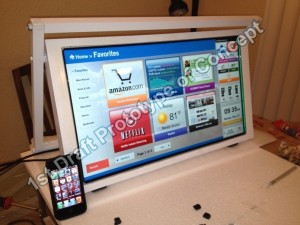 Last month, I officially crossed the line into geezerhood.
Last month, I officially crossed the line into geezerhood.
Entering the land of Medicare as part of the baby boom vanguard has served the heighten my irritation at the tech world’s frequently patronizing, even pitying attitude toward what it regards as the clueless old. Marketers ignore this fast growing demographic at their peril, but those who think of us geezers only as customers for medical devices and dumbed-down computers are making an even bigger mistake.
My hackles (I think you develop those with advancing age) were raised today by a Kickstarter project called Pure Device, brought to my attention by Ross Rubin. Pure Device is a cloud-based touchscreen tablet in a frame with what appears to be a much simplified user interface. Its marketing pitch: “In the U.S. alone, there are 34 million people over the age of 65, a large percentage of whom struggle with effectively using the current available technologies. As a result, it is hard for them to stay connected with their families due to this sharp divide in accessible and user-friendly technology.”
 Let’s look at the intersection of today’s 65-year-old and technology. Many of us were introduced to computers in college in the 1960s; my first computer was an IBM 7090 mainframe. Many of us learned about electronics building things from Heathkit or with bits from Radio Shack. By the mid-1980s, when we were in our late 30s, PCs were invading the workplace in significant numbers. By the mid-90s, home computers were becoming ubiquitous and many of us had our first cell phones, often in the form of a car phone. By the late 90s, we were all on the internet (or at least AOL.)
Let’s look at the intersection of today’s 65-year-old and technology. Many of us were introduced to computers in college in the 1960s; my first computer was an IBM 7090 mainframe. Many of us learned about electronics building things from Heathkit or with bits from Radio Shack. By the mid-1980s, when we were in our late 30s, PCs were invading the workplace in significant numbers. By the mid-90s, home computers were becoming ubiquitous and many of us had our first cell phones, often in the form of a car phone. By the late 90s, we were all on the internet (or at least AOL.)
In other words, most people in their 60s have been familiar with personal technology most of our working lives. We have laptops and desktops, iPhones, Androids, BlackBerries, and iPads–and we know how to use them. There are lots of 60-somethings in the crowds that pack my local Apple Store.
The reality is that as we get older, vision and hearing tend to deteriorate and arthritis and other conditions can limit dexterity. These mostly are not serious issues for those of use in our 60s, but they become more so in the 70s and beyond. But what they call for is the use of good adaptive technology to facilitiate use, not a dumbing down that assumes we are ignorant and incapable of learning. (Sadly, dementia and other cognitive impairments do become a growing problem with advancing age, but it’s not clear to me that any of the non-medical products being marketed to today’s 65+ population address this in any serious way.)
Not everyone is missing the boat. Longtime tech journalist Gary Kaye has stared a web site called In the Boombox, aimed at tech-savvy and active baby boomers. (The current home page features two GPS devices for back-country hikers.) But despite the interest and high disposable income of the baby boomer generation, efforts such as this are rare.
The tech world is a kingdom of the young, a place where 43-year-old Sheryl Sandberg is regarded as a (metaphorical) graybeard and 56-year-old Bill Gates a fossil. It’s not surprising that the young whippersnappers who run the industry view people their parents’ age as ancient, irrelevant, and probably helpless. But they are making a big mistake.
P.S.–Pure Device, your pictures make it look as though that tablety thing is designed primarily as a stationary device held vertical in its frame. The ergonomics of touch are awful on vertical surfaces and vertical touch keyboards are nearly impossible to use. We boomers are comfortable with keyboards; we’ve used them all our lives. Think about adding one.
